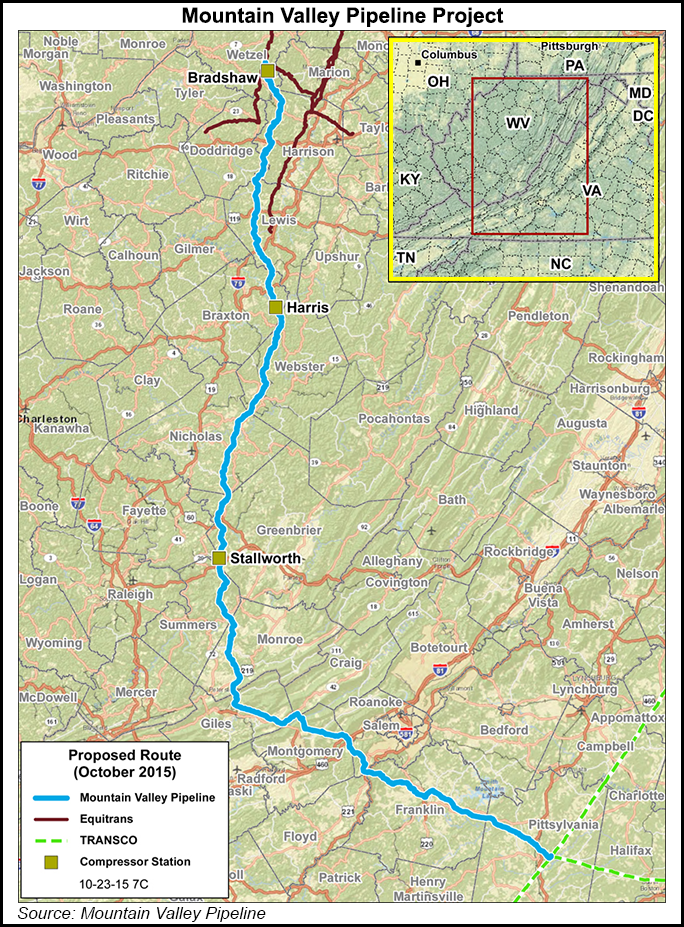Infrastructure | NGI All News Access | Regulatory
MVP ‘Doing the Right Thing,’ Limiting Construction to Preserve Habitats
Mountain Valley Pipeline LLC’s (MVP) decision to do “the right thing” and halt construction at points across its 300-mile route to better protect endangered species appears to have satisfied federal regulators and has for now staved off a stop-work order for the entire project.

Days after environmental groups asked a federal court to review the Biological Opinion (BO) and Incidental Take Statement (ITS) issued by the U.S. Fish and Wildlife Service (USFWS), MVP on Thursday said it would voluntarily stop work in some areas. Specifically, the company said it would halt construction activities where construction might imperil federally listed species or risk modifying their habitats.
When asked how much work would be impacted, spokesperson Natalie Cox said “MVP’s voluntary suspension is not a matter of miles, it is a matter of doing the right thing.” The company notified FERC of its decision on Thursday in response to a letter from the Sierra Club asking the USFWS to suspend the BO and ITS while it challenges the approvals in the U.S. Court of Appeals for the Fourth Circuit. The group also asked the Federal Energy Regulatory Commission for a stay.
The approvals, issued under the Endangered Species Act, are required for the 2 Bcf/d project’s federal certification. Suspending them would likely stop work altogether.
The USFWS has yet to weigh in on MVP’s decision. However, on Friday FERC agreed and said only that construction the company has identified can’t resume until it has permission from the Commission’s Office of Energy Projects.
MVP, designed to move more Appalachian gas to markets in the Southeast, told regulators that it had already limited some activities prior to Thursday’s filing. The company added that the decision also followed months of discussions with FERC and USFWS.
The company said it would not cut down trees larger than three inches in diameter to avoid adverse impacts to the habitat of the Indiana and Northern long-eared bats. The company said it has also suspended ground clearing, construction and stream crossing activities to avoid impacts to two fish species, the Roanoke logperch and candy darter. Cox said the company expects to continue with construction, “where permitted,” in other areas along the route.
ClearView Energy Partners LLC said in a note to clients that environmental groups could still seek a stay in the Fourth Circuit. “At this time, we cannot judge whether the court would be inclined to grant such a stay request should one be filed,” analysts said.
In its petition to the Fourth Circuit, a coalition of groups including Wild Virginia and the Sierra Club argued that the USFWS failed to protect the endangered Roanoke logperch. The groups also claimed that the agency didn’t set limits for the number of threatened or endangered bats that could be harmed or killed by the pipeline’s construction.
The move follows a similar strategy environmental groups used against the Atlantic Coast Pipeline (ACP). The Fourth Circuit has vacated the USFWS approvals on two separate occasions, leading to work stoppages for that similarly routed project.
Cox said on Friday MVP is still targeting a mid-2020 in-service date and projected costs remain unchanged at $4.8-5 billion. MVP is more than 85% complete, but it’s faced repeated delays after losing approvals and permits that are still pending.
The project has seen positive movement on one permit stalled for nearly a year. The U.S. Army Corps of Engineers is poised to issue a new Nationwide Permit 12 (NWP) after the U.S. Environmental Protection Agency (EPA) on Thursday signed off on changes related to the NWP 12, which is needed to conduct water-crossing work.
The Fourth Circuit in October 2018 vacated the authorization. The Army Corps, which quickly suspended the permit, had required a more environmentally protective dry-cut crossing method at four rivers in West Virginia, but the Fourth Circuit found that it didn’t comply with the state’s water quality regulations. While the state had waived its review of the project, the ruling implied that the regulations had to be revised to accommodate the crossing method. The West Virginia Department of Environmental Protection (WVDEP) finished revising the regulations in April.
The EPA indicated in a letter on Thursday to WVDEP that its revisions are in compliance with federal law. However, ClearView noted that given MVP’s latest announcement to suspend construction in some areas, construction work on waterbody crossings isn’t likely to start anytime soon even if the Army Corps issues a new NWP 12 quickly.
While MVP and ACP are among some of the final large greenfield pipeline projects still pending for the Appalachian Basin, projects that are already in service continue to be challenged in a sign of the resistance facing infrastructure in the Northeast.
The U.S. Court of Appeals for the Third Circuit on Thursday rejected the Delaware Riverkeeper Network’s challenge to the Section 401 Water Quality Certification Pennsylvania issued to the Atlantic Sunrise expansion in 2016. That project entered service in 2018, and the court found that a public comment period was not unlawfully bypassed. Similar challenges to the permit were rejected by the court last year.
© 2024 Natural Gas Intelligence. All rights reserved.
ISSN © 1532-1231 | ISSN © 2577-9877 |
